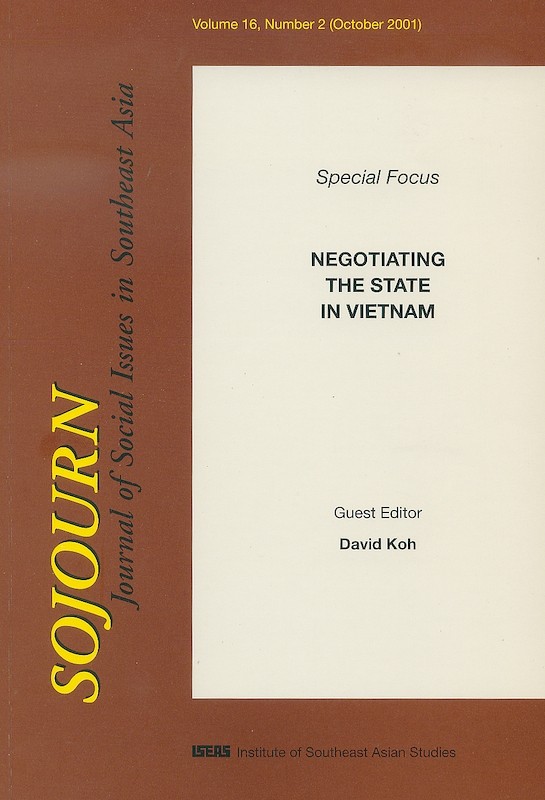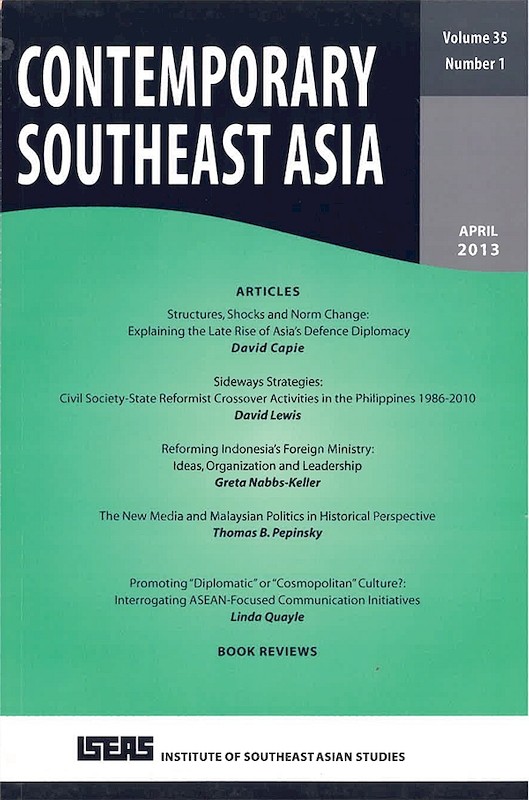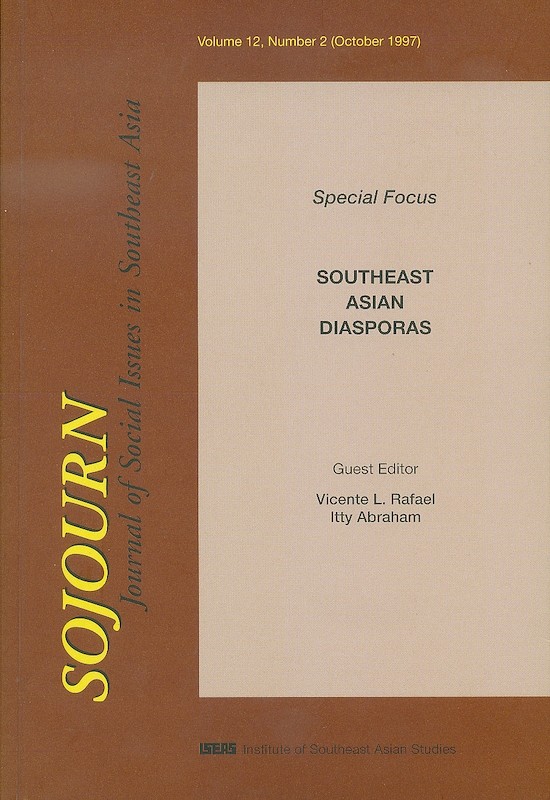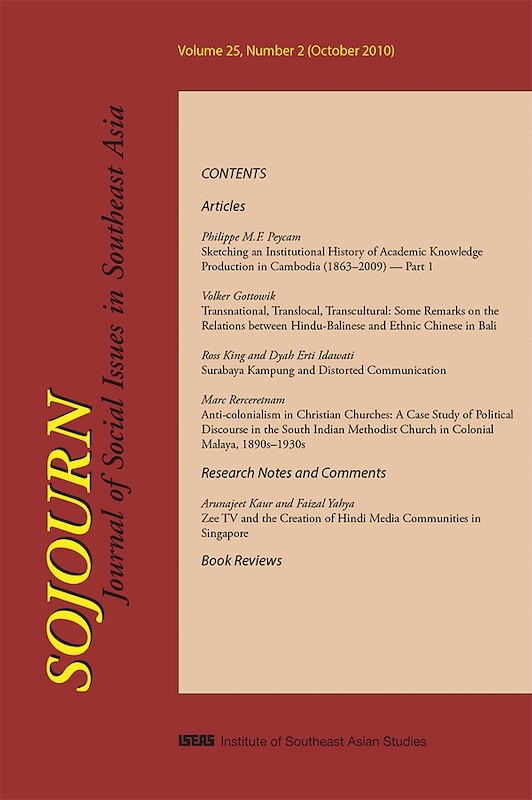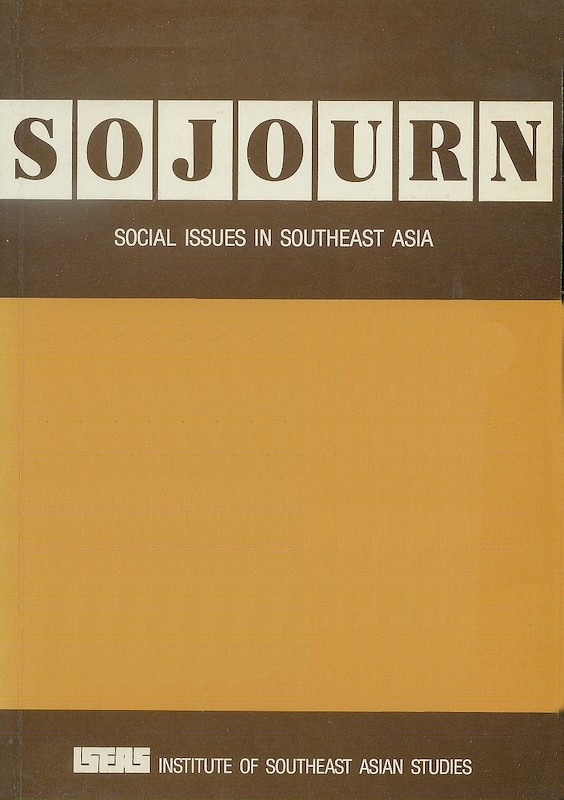SOJOURN: Journal of Social Issues in Southeast Asia Vol 9/2 (Oct 1994). Special Focus on "Mass Media: Local and Global Positions"
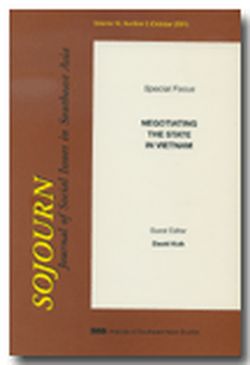
Date of publication:
October 1994
Publisher:
Institute of Southeast Asian Studies
Number of pages:
135
Code:
SJ9/2
Contents
-
Preliminary pages
-
Preface to the Special Focus on "Mass Media: Local and Global Positions", by Zaharom Nain, Yao Souchou, authors
- ARTICLES
-
Commercialization and Control in a "Caring Society": Malaysian Media "Towards 2020", by Zaharom Nain, author see abstractIn recent years, the Malaysian Government has begun to push the country towards attaining "developed country" status by the year 2020. In 1991, the Malaysian Prime Minister unveiled his "Vision 2020", proposing nine challenges that the nation as a whole needs to face. This paper examines the implications of the Vision for the Malaysian media. It argues that while the media has been quick to support the Vision, circumstances surrounding the operations and development of the media nonetheless need to be re-examined. Failure to do this will lead to an ironic situation in which the media and those determining its policies will not be operating according to the spirit of the Vision and will, in fact, be opposing it.
-
The Malaysian Press and Representation of Minority Groups, by Mustafa K Anuar, author see abstractThe Malaysian Government places heavy emphasis on the socioeconomic development of the country. The right of the public to express views on the quality and direction of development is made especially pertinent by the notion of a Caring Society put forward by the present administration. It is expected that the mass media will play an important role in helping Malaysians, especially the minority groups, to find their voices in this context. This paper examines the structural conditions that facilitate the emergence of an open and a responsive media in Malaysia.
-
Gender and the New Communication Technology in Malaysia, by Wang Lay Kim, author see abstractThis paper discusses the implications of new information technology such as satellite broadcasting on society and women in particular. The advent of new technological development will increase the carrying capacity of television to thirty or forty channels, and the impact of this on the equity situation with regard to class, gender, and race needs close attention. This paper looks at how the media perpetuates and constructs certain images of women and speculates how this can be exacerbated by new technologies such as satellite television.
-
Return to Asia? Japan in the Global Audio-Visual Market, by Koichi Iwabuchi, author see abstractThe Japanese cultural industry is seeking to enter the blooming Asian audio-visual market. The strategy is to produce "localized" cultural products based on the principle of "global localization". Global corporations are becoming increasingly sensitive to local preferences while aggressively offering their standardized commodities. In this "return to Asia" Japan makes a claim of common "Asianness" with other countries in the region, a claim that constitutes a significant economic and marketing strategy.
-
Global Introduction: An Analysis of Singapore's Initial Contributions on CNN's World Report, by Robert Amstrong, author see abstractSince 1990, Singapore has consistently contributed to Cable News Networks World Report, an unedited and inexpensive communications forum reaching millions of viewers in nearly every world capital via satellite. For all its efforts, the picture of Singapore and its three million residents remains confused and unclear. This study examines the reasons for the lack of international media clarity for Singapore and what can be done to remedy the situation.
- RESEARCH NOTES AND COMMENTS
-
Communication, Consensus, and the Fallacy of Rationality, by Yao Souchou, author see abstractCommunication research is marred by the dominance of empiricism. Some have tried to overcome the problem, via Habermas, by introducing the idea of "communicative competence" as a condition of rational discourse. The objective is to arrive at a democratic "rationally motivated" consensus. The project is shown to be one of liberal faith, and overly relies on the assumption of rationality
-
Tongkang, Twakow, and Lightermen: A People's History of the Singapore River, by Stephen Dobbs, author see abstractFor more than 160 years the commercial activity of the Singapore River contributed much to the prosperity of Singapore. This is a 'fact' that has been paid much lip service. But little has been done by historians to document just how substantial the role of the river was in Singapore's growth as an entrepot. The river was much more than a commercial artery; it was a place where real people lived, worked, and died. Only when all this dimensions have been examined will we be able to say with some conviction what the role of the river had been in Singapore's past.
-
"Environment" as a Social Concern: Democratizing Public Arenas in Singapore?, by Lily Kong, author see abstractThis paper explores the question of who defines the agenda of environmental concerns in Singapore. It argues that the state plays an inordinately large role in defining the agenda and implementing the solutions. Few other competing environmental agendas have been set in alternative public arenas. While this has work generally well in Singapore, there are larger roles for environmental groups, businesses and industries, and other bodies to play. It is in the enlarged roles of these bodies that the hope for a greater democratization of public arenas in Singapore lies.
- BOOK REVIEWS
-
BOOK REVIEW: Public Space: Design, Use and Management. Edited by Chua Beng Huat and Norman Edwards., by Scott Macleod, author
-
BOOK REVIEW: Quand la riziere rencontre l'asphalte... Semis urbain et processus d'urbanisation a Java-est. Edited by Manuelle Franck., by Sylvain Lefebvre, author
-
BOOK REVIEW: Between Sovereign Domain and Servile Tenure: The Development of Rights to land in Java, 1789-1870. By Peter Boomgaard., by James J Fox, author
-
BOOK REVIEW: Imagining India. By Ronald Inden, by P Ramasamy, author
-
CONFERENCES, WORKSHOPS, AND SEMINARS see abstractSymposium on "Problemattizing Culture: Media, Identity, and the State in Southeast Asia", Institute of Southeast Asian Studies, Singapore, 28-29 November 1994; Conference on "Memory and the Second World in International Comparative Perspective", Amsterdam, 26-28 April 1995
-
Index to SOJOURN: Journal of Social Issues in Southeast Asia, vol. 9 (1994)


